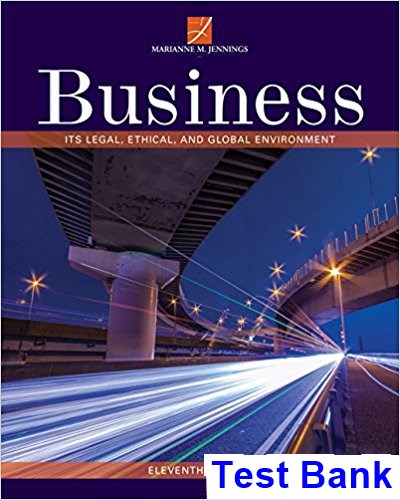This is completed downloadable of Business Its Legal Ethical and Global Environment 11th Edition Jennings Test Bank

Product Details:
- ISBN-10 : 1337103578
- ISBN-13 : 978-1337103572
- Author:
Discover how laws and ethical issues are critical to all business decisions as you review business situations from today’s headlines and more with the comprehensive and realistic BUSINESS: ITS LEGAL, ETHICAL, AND GLOBAL ENVIRONMENT, 11E. Learning both the law and ethical standards in the context of business dilemmas provides you with the insight and analytical skills that today’s employers want. More than 200 real-world scenarios help you understand the what, why, and how of legal issues as you explore the various areas of law. You will not only understand that copyright infringement violates the law, but you will also be able to list examples of similar businesses violations, such as Monster Energy using Beastie Boys music in an online video. Packed with active learning features, this edition illustrates just how law and ethics apply to issues in the business world today. MindTap online solution is also available to help you prepare for this course.
Table of Content:
- Part 1: Business: Its Legal, Ethical, and Judicial Environment
- Ch 1: Introduction to Law
- 1-1 Definition of Law
- 1-2 Classifications of Law
- 1-3 Purposes of Law
- 1-4 Characteristics of Law
- 1-5 The Theory of Law: Jurisprudence
- 1-6 Sources of Law
- 1-7 Introduction to International Law
- Summary
- Questions and Problems
- Ch 2: Business Ethics and Social Responsibility
- 2-1 What Is Ethics?
- 2-2 What Is Business Ethics?
- 2-3 What Are the Categories of Ethical Dilemmas?
- 2-4 Resolution of Business Ethical Dilemmas
- 2-5 Why We Fail to Reach Good Decisions in Ethical Dilemmas
- 2-6 Social Responsibility: Another Layer of Business Ethics
- 2-7 Why Business Ethics?
- 2-8 Importance of Ethics in Business Success and the Costs of Unethical Conduct
- 2-9 Creation of an Ethical Culture in Business
- 2-10 Ethical Issues in International Business
- Summary
- Questions and Problems
- Ch 3: The Judicial System
- 3-1 Types of Courts
- 3-2 How Courts Make Decisions
- 3-3 Parties in the Judicial System (Civil Cases)
- 3-4 The Concept of Jurisdiction
- 3-5 Subject Matter Jurisdiction of Courts: The Authority over Content
- 3-6 In Personam Jurisdiction of Courts: The Authority over Persons
- 3-7 The International Courts
- Summary
- Questions and Problems
- Ch 4: Managing Disputes: Alternative Dispute Resolution and Litigation Strategies
- 4-1 What Is Alternative Dispute Resolution?
- 4-2 Types of Alternative Dispute Resolution
- 4-3 Resolution of International Disputes
- 4-4 Litigation versus ADR: The Issues and Costs
- 4-5 When You Are in Litigation
- 4-6 Issues in International Litigation
- Summary
- Questions and Problems
- Part 2: Business: Its Regulatory Environment
- Ch 5: Business and the Constitution
- 5-1 The U.S. Constitution
- 5-2 The Role of Judicial Review and the Constitution
- 5-3 Constitutional Limitations of Economic Regulations
- 5-4 State versus Federal Regulation of Business-Constitutional Conflicts: Preemption and the Suprema
- 5-5 Application of the Bill of Rights to Business
- 5-6 The Role of Constitutions in International Law
- Summary
- Questions and Problems
- Ch 6: Administrative Law
- 6-1 What Are Administrative Agencies?
- 6-2 Roles of Administrative Agencies
- 6-3 Laws Governing Administrative Agencies
- 6-4 The Functions of Administrative Agencies and Business Interaction
- 6-5 Business Rights in Agency Enforcement Action
- 6-6 The Role of Administrative Agencies in the International Market
- Summary
- Questions and Problems
- Ch 7: International Law
- 7-1 Sources of International Law
- 7-2 Trust, Corruption, Trade, and Economics
- 7-3 Resolution of International Disputes
- 7-4 Principles of International Law
- 7-5 Protections in International Competition
- Summary
- Questions and Problems
- Ch 8: Business Crime
- 8-1 What Is Business Crime? The Crimes within a Corporation
- 8-2 What Is Business Crime? The Crimes against a Corporation
- 8-3 Who Is Liable for Business Crime?
- 8-4 Federal Laws Targeting Officers and Directors for Criminal Accountability
- 8-5 The Penalties for Business Crime
- 8-6 Elements of Business Crime
- 8-7 Examples of Business Crimes
- 8-8 Procedural Rights for Business Criminals
- 8-9 Business Crime and International Business
- Summary
- Questions and Problems
- Ch 9: Business Torts
- 9-1 What Is a Tort? Roots of Law and Commerce
- 9-2 The Intentional Torts
- 9-3 Negligence
- 9-4 New Verdicts on Tort Reform
- Summary
- Questions and Problems
- Ch 10: Environmental Regulation and Sustainability
- 10-1 Common Law Remedies and the Environment
- 10-2 Statutory Environmental Laws: Air Pollution Regulation
- 10-3 Statutory Environmental Law: Water Pollution Regulation
- 10-4 Statutory Environmental Law: Solid Waste Disposal Regulation
- 10-5 Statutory Law: Environmental Quality Regulation
- 10-6 Statutory Law: Other Federal Environmental Regulations
- 10-7 Enforcement of Environmental Laws
- 10-8 International Environmental Issues
- Summary
- Questions and Problems
- Part 3: Business Sales, Contracts, and Competition
- Ch 11: Contracts and Sales: Introduction and Formation
- 11-1 What Is a Contract?
- 11-2 Sources of Contract Law
- 11-3 Types of Contracts
- 11-4 Consumer Credit Contracts
- 11-5 Formation of Contracts
- 11-6 Issues in Formation of International Contracts
- Summary
- Questions and Problems
- Ch 12: Contracts and Sales: Performance, Remedies, and Collection
- 12-1 Defenses in Contract Formation
- 12-2 Contract Performance
- 12-3 Nonperformance and Nonpayment-The Collection Remedies
- 12-4 Contract Remedies for Nonperformance
- 12-5 Third-Party Rights in Contracts
- 12-6 International Issues in Contract Performance
- Summary
- Questions and Problems
- Ch 13: Product Advertising and Liability
- 13-1 Development of Product Liability
- 13-2 Advertising as a Contract Basis for Product Liability
- 13-3 Contract Product Liability Theories: Implied Warranties
- 13-4 Strict Tort Liability: Product Liability under Section 402A
- 13-5 Defenses to Product Liability Torts
- 13-6 Product Liability Reform
- 13-7 Federal Standards for Product Liability
- 13-8 International Issues in Product Liability
- Summary
- Questions and Problems
- Ch 14: Business Competition: Antitrust
- 14-1 What Interferes with Competition? Covenants Not to Compete
- 14-2 What Interferes with Competition? An Overview of the Federal Statutory Scheme on Restraint of
- 14-3 Horizontal Restraints of Trade
- 14-4 Vertical Trade Restraints
- 14-5 What Are the Penalties and Remedies for Anticompetitive Behavior
- 14-6 Antitrust Issues in International Competition
- Summary
- Questions and Problems
- Ch 15: Business and Intellectual Property Law
- 15-1 What Can a Business Own? Intangible Property Rights
- 15-2 Patents
- 15-3 Copyrights
- 15-4 Trademarks
- 15-5 Trade Secrets
- 15-6 International Intellectual Property Issues
- 15-7 Enforcing Business Property Rights
- Summary
- Questions and Problems
- Part 4: Business Management and Governance
- Ch 16: Management of Employee Conduct: Agency
- 16-1 Names and Roles: Agency Terminology
- 16-2 Creation of the Agency Relationship
- 16-3 The Principal-Agent Relationship
- 16-4 Liability of Principals for Agents’ Conduct: The Relationship with Third Parties
- 16-5 Termination of the Agency Relationship
- 16-6 Termination of Agents under Employment at Will
- 16-7 Agency Relationships in International Law
- Summary
- Questions and Problems
- Ch 17: Governance and Structure: Forms of Doing Business
- 17-1 Sole Proprietorships
- 17-2 Partnerships
- 17-3 Limited Partnerships
- 17-4 Corporations
- 17-5 Limited Liability Companies
- 17-6 Limited Liability Partnerships
- 17-7 International Issues in Business Structure
- Summary
- Questions and Problems
- Ch 18: Governance and Regulation: Securities Law
- 18-1 History of Securities Law
- 18-2 Primary Offering Regulation: The 1933 Securities Act
- 18-3 The Securities Exchange Act of 1934
- 18-4 State Securities Laws
- 18-5 International Issues in Securities Laws
- Summary
- Questions and Problems
- Ch 19: Management of Employee Welfare
- 19-1 Wage and Hours Protection
- 19-2 Workplace Safety
- 19-3 Employee Pensions, Retirement, and Social Security
- 19-4 Workers’ Compensation Laws
- 19-5 Statutory Protections of Employees through Labor Unions
- 19-6 International Issues in Labor
- Summary
- Questions and Problems
- Ch 20: Management: Employment Discrimination
- 20-1 History of Employment Discrimination Law
- 20-2 Employment Discrimination: Title VII of the Civil Rights Act
- 20-3 Theories of Discrimination under Title VII
- 20-4 Specific Applications of Title VII
- 20-5 Antidiscrimination Laws and Affirmative Action
- 20-6 The Defenses to a Title VII Charge
- 20-7 Enforcement of Title VII
- 20-8 Other Antidiscrimination Laws
- 20-9 The Global Workforce
- Summary
- Questions and Problems
- Appendices
- Appendix A: The United States Constitution
- Appendix B: The Foreign Corrupt Practices Act (Excerpts)
- Appendix C: The Uniform Commercial Code (Excerpts)
- Appendix D: Dodd-Frank (Wall Street Reform and Consumer Financial Protection Act) Key Provisions
- Appendix E: The Securities Act of 1933 and the Securities Exchange Act of 1934 (Excerpts)
- Appendix F: Sarbanes-Oxley Key Provisions (Excerpts)
- Appendix G: The Copyright Act (as Amended) (Excerpts)
- Appendix H: Title VII and the Civil Rights Act (Employment Provisions) (Excerpts)
- Appendix I: The Americans with Disabilities Act (Excerpts)
- Glossary
- Table of Cases
- Table of Products, People, and Companies
- Index





